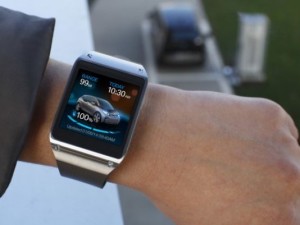 On Monday Samsung will unveil its second-generation Galaxy Gear smartwatch, this one running the open source Tizen operating system, not the Android software that runs the first-generation model, according to reports.
On Monday Samsung will unveil its second-generation Galaxy Gear smartwatch, this one running the open source Tizen operating system, not the Android software that runs the first-generation model, according to reports.
Samsung won’t comment on the reports, which first appeared in USA Today on Tuesday. The report quoted three unnamed sources said to be familiar with Samsung’s plans.
The watch, set for unveiling next Monday in Barcelona in conjunction with Mobile World Congress, will run a new version of Tizen that relies upon HTML 5, according to the newspaper’s sources.
Four analysts said the move can help Samsung seed the infant smartwatch market with the relatively unknown Tizen OS. In theory at least, the move would let application developers build Tizen apps for the next Galaxy Gear on an HTML 5 framework, the analysts said. Such development projects could be less complex than re-working Android apps used on smartphones for smartwatches.
Samsung has been working with Tizen, an open-source OS, and was expected to announce a Tizen smartphone last year, but did not.
Samsung has persistently said it cooperates with Google on the Google-managed Android ecosystem. However, analysts also note that Samsung doesn’t want to grow overly dependent on Android. In recent years, Samsung has worked with at least five different operating systems for its products.
Samsung is by far the largest maker of Android smartphones and its relationship with Google is complex. Recently the two companies signed a 10-year cross-licensing deal on patents, while Google also sold Motorola to Lenovo. The latter move allayed Samsung concerns that Motorola could get preferentially treatment for Android innovations.
In the smartwatch business, Samsung has a chance to be early to market and to benefit from using an OS not tied to Google. Google, Apple and Microsoft are all expected to launch smartwatches in the coming year in a market analysts say could explode within five years. Smartwatches are seen by most analysts as part of a growing mobile ecosystem that will rely heavily on smartphones – mainly by acting as second display for apps running on smartphones.
Given the expected primacy of smartwatches in coming years, Samsung clearly wants to be an early supplier and would prefer to use an OS not directly tied to Google, analysts said.
“Smartwatches are an add-on that will have a role to play in their own right as a part of the ‘connected everything,'” said Carolina Milanesi, an analyst at Kantar WorldPanel. Putting Tizen on the next Galaxy Gear “helps Samsung seed the market with something that runs Tizen. They are going about it in a way that might appear less threatening to Google.”
Milanesi said it’s possible for a Tizen-based Galaxy Gear to be compatible with both Android and iOS devices. Currently, however, Samsung’s $300 Galaxy Gear works only with a few Android-powered Samsung Galaxy smartphones via a Bluetooth connection.
Milanesi warned that if Samsung hopes to succeed at seeding the market with a Tizen device, the price will need to be much lower than the current Gear model, around $150.
Samsung has been a diverse manufacturing company and its ability to produce its own processors and displays makes it willing to produce a large array of smartphones and tablets in many sizes. Given Samsung’s immense size and product prowess, it follows that it could try to boost Tizen on its smartwatch.
“Strategically, it makes sense for Samsung to invest in a Tizen-based smartwatch, as they need at some point to control their own experience,” said Patrick Moorhead, an analyst at Moor Insight & Strategy. It won’t be as hard to produce a few dozen apps for a Tizen smartwatch as it would be for Tizen smartphone apps, he added.
“I don’t think this is so much a slap at Google as it is a recognition that a smartwatch could be a good platform for Tizen because new apps are going to have to be built from scratch anyway,” added Bob O’Donnell, an analyst at Technalysis Research and a former IDC analyst.
“The OS on a smartwatch is actually not that important because given the tiny size of the screen, you can’t leverage existing Android applications–everything has to be rewritten anyway,” O’Donnell said. “The critical question is what platforms will the smartwatch communicate with and I’m sure they’ll make it work with Android smartphones and tablets … but probably not with iOS.”





